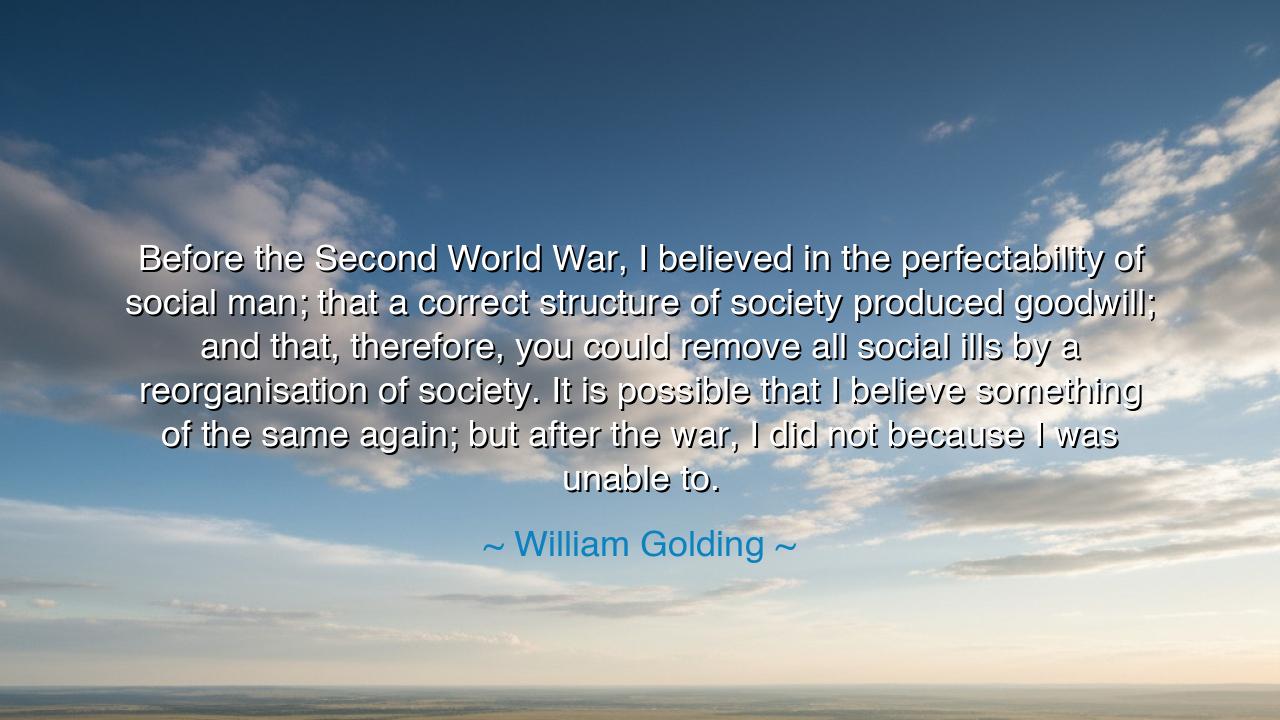
Before the Second World War, I believed in the perfectability of
Before the Second World War, I believed in the perfectability of social man; that a correct structure of society produced goodwill; and that, therefore, you could remove all social ills by a reorganisation of society. It is possible that I believe something of the same again; but after the war, I did not because I was unable to.






Hear the voice of William Golding, author and witness to the terrors of the twentieth century, when he confessed: “Before the Second World War, I believed in the perfectability of social man; that a correct structure of society produced goodwill; and that, therefore, you could remove all social ills by a reorganisation of society. It is possible that I believe something of the same again; but after the war, I did not because I was unable to.” These words bear the sorrow of a man who saw innocence shattered, who learned that human cruelty cannot be erased by structure alone, and that evil lies not only in systems, but within the heart of man.
In his youth, Golding embraced the dream that many reformers cherished—that the right laws, the right institutions, the right balance of power could make man good. If men warred, it was because society was wrongly shaped; if men oppressed, it was because the order of life was unjust. To correct the structures, to redistribute power, to lift up the poor—this, he believed, would cleanse the world of its ills. It was a noble hope, the dream of generations who sought utopia through reason and reform.
But the Second World War shattered that dream. Golding saw with his own eyes the depths to which humanity could sink: concentration camps built not by chaos, but by order; extermination carried out with precision, discipline, and bureaucracy. The Holocaust, the fire-bombings, the unleashing of atomic fire upon cities—all showed him that evil is not banished by society’s structures, for structures can themselves be turned into weapons. Man is not perfected by rules, for man himself carries within him the seed of cruelty.
Consider the Nazi regime, born not of anarchy but of order—an order crafted by ideology, law, and obedience. It was not the collapse of society, but its cold efficiency, that enabled millions to be slaughtered. Teachers, doctors, engineers—all played their part in destruction. Here is the truth that shook Golding: the ills of mankind cannot be erased merely by reshaping society, for they rise first from within the heart. No structure, however just, can fully banish greed, fear, or hatred.
This revelation shaped Golding’s most famous work, Lord of the Flies. In that tale, boys marooned on an island attempt to build order. Yet, stripped of the thin veneer of civilization, they descend into savagery. His story was not merely fiction—it was a parable of his own discovery: that the darkness of man is never wholly restrained by society. Civilization may cover it, may delay it, but under stress it erupts, revealing that evil lies deeper than law, deeper than politics. It lies in man himself.
Yet, though Golding speaks with sorrow, he does not counsel despair. He admits, even in the quote, that perhaps he still clings to hope, that society may yet shape us toward goodwill, even if imperfectly. His wisdom is not to reject the labor of reform, but to temper it with realism. Utopias built on blind faith in human goodness will crumble. But societies built with vigilance—aware of man’s darker impulses, creating safeguards against tyranny, nurturing compassion deliberately—may endure and grow.
The lesson for us is clear: do not believe that laws alone can redeem the human heart, nor that structures alone can make men virtuous. But do not abandon the work of shaping society, for without it, cruelty reigns unchecked. Instead, labor on two fronts: build just institutions, and cultivate within yourself and others the virtues of mercy, restraint, and humility. For only when inner change joins outer reform can social man hope to rise above his shadows.
Therefore, O listener, let your actions be these: strive for justice in the structures of your world, but never forget to examine your own heart. Teach your children that society may guide, but conscience must govern. Be vigilant against the belief that perfection is possible, yet also resist the despair that says nothing can be done. Golding’s wisdom is a warning, but also a charge: the struggle is endless, yet it is the only struggle worthy of mankind. For though we may never perfect the human race, we may yet lessen its cruelties and kindle sparks of light within the dark.






AAdministratorAdministrator
Welcome, honored guests. Please leave a comment, we will respond soon